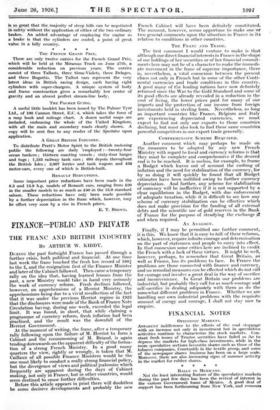FINANCE-PUBLIC AND PRIVATE
THE FRANC AND BRITISH INDUSTRY
By ARTHUR W. KIDDY.
DURING the past fortnight France has passed through a further crisis, both political and financial. At one time last week the franc touched the fresh low record of 1801 to the £, and the resignation first of the Finance Minister and later of the Cabinet followed. Then came a temporary rally on the idea that, having learned lessons from the past, a new Ministry would take in hand very seriously the work of currency reform. Fresh declines followed, however, on apprehensions of a Herriot Ministry, the apprehensions being due to a vivid recollection of the fact that it was under the previous Herriot regime in 1925 that the disclosures were made-of the Bank of France Note Circulation having, during one week, exceeded the legal limit. It was found, in short, that while claiming a programme of currency reform, fresh inflation had been practised, and the result was 'the downfall of the HeiTiot Government. At the moment of writing, the franc, after a temporary rally following upon the failure of M. Herriot to form a Cabinet and the resummoning of M. Briand, is again tending downwards on the apparent difficulty of the forma- tion of a strong French Ministry. In a good many quarters the view, rightly or wrongly, is taken that M. Caillaux of all possible Finance Ministers would be the one most likely to conduct a really strong financial policy, but the divergence of views and political jealousies which frequently are apparent during the days. of Cabinet making, not only in France, but in other countries, would seem destined to cause further difficulties. Before this article appears in print there will doubtless be some decisive developments and probably the new French Cabinet will have been definitely constituted. The moment, however, seems opportune to make one'or two general comments upon the situation in France in its relation to conditions in other countries.
THE FRANC AND TRADE.
.
The first comment I would venture to make is that although our direct financial interests in France in the shape of our holdings of her securities or of her financial commit- ments here may not be of a character to make the immedi- ate movement in the franc of supreme importance, there is, nevertheless, a vital connexion between the present chaos not only in French but in some of the other Conti- nental currencies and trade conditions in this country. A good many of the leading nations have now definitely returned since the War to the Gold Standard and some of its good effects are already revealed in a reduction in the cost of living, the lower prices paid for many of our imports and the protection of our income from foreign investments held in sterling form. Nevertheless, so long as important countries like France, Belgium and Italy are experiencing depreciated currencies, we must expect to find not only our exports to those countries declining, but must also look to find these same countries powerful competitors in our export trade generally.
COMPREHENSIVE SCHEME REQUIRED.
Another comment which may perhaps be made on the measures to be adopted by any new French Ministry with regard to fiscal and currency reforms is thit they must be complete and comprehensive if the desired end is to be reached. It is useless, for example, to frame a Budget which leaves out of account the curbing of inflation and the need for stabilization of the currency, for by so doing it will quickly be found that all Budget estimates have been nullified owing to further currency depreciation. And further, any scheme for stabilization of currency will be ineffective if it is not supported by a clear equilibrium in the Budget, with due enforcement of adequate taxation, while it is difficult to see how any scheme of currency stabilization can be effective which does not make provision for the funding of all external debts and the scientific use of gold reserves in the Bank of France for the purpose of steadying the exchange if and when required.
AN ANALOGY.
Finally, if I may be permitted one further comment, it is this. We know that it is easy to talk of these reforms, which, however, require infinite courage and determination on the part of statesmen and people to carry into effect. In that connexion some critics here are inclined to credit the French with a lack of these virtues. It might be well, however, perhaps, to remember that Great Britain, as well as France, perhaps, its problems to face. In France the problems are those connected with finance and currency, and no remedial measures can be effected which do not call for courage and involve a great deal in the way of sacrifice and inconvenience. In Great Britain our problems are industrial, but probably they call for as much courage and -self-sacrifice in dealing adequately with them as do the somewhat different problems in France. Whether we are handling our own industrial problems with the requisite amount of energy and courage, I shall not stay now to enquire.










































 Previous page
Previous page